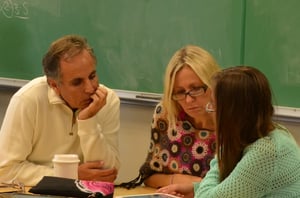 Anticipation of conferences with teachers creates a whole range of feelings for parents: nervousness, excitement, curiosity, uncertainty. The most successful conferences are based on dialogue – a back and forth of sharing what the teacher and the parent know and hope for the child. You, as the parent, know the child as no one else. You are the advocate, the realist, and the holder of aspirations.
Anticipation of conferences with teachers creates a whole range of feelings for parents: nervousness, excitement, curiosity, uncertainty. The most successful conferences are based on dialogue – a back and forth of sharing what the teacher and the parent know and hope for the child. You, as the parent, know the child as no one else. You are the advocate, the realist, and the holder of aspirations.
The teacher knows the child as a learner. How does s/he approach the tasks of learning? How does the child learn and play within a community of other children? The parent sees the child as one, and the teacher sees the child as a unique one in relation to many other children. When those two perspectives are combined, the strongest partnership between home and school can be built.
I hope in your conferences you discover that the teacher sees some of the same strengths and vulnerabilities as you do, and the teacher sees parts of your child you did not know. This is an opportunity for you to add to your body of knowledge about the child you love so dearly.
Parents often do not realize they have much to contribute to the conferences. They see the conference as a time to receive information but they can miss the possibility to help their child as a learner. The conference is not a test to see how much the teacher knows about your child. Rather, it is a first step toward building the triad of school, home and child.
Here’s the inside scoop on what teachers wish parents did for the conferences:
- Think about your child’s strengths. What are her/his islands of confidence and competence? How might your child’s strengths be used during the day?
- Reflect on what your child says about friendships and learning. What make sense to you about his/her friendships and learning and what needs clarification?
- Think back to last year. What issues are still lingering for you and for your child?
- Pay attention to your watch. Arrive on time and don’t use the next person’s conference time to finish. You might have a doctor which is maddenly, consistently late. Teachers do not want to be that doctor. They want to be on time.
- Articulate what you hope for your child this year. Hopes, wishes and aspirations are inspiring to teachers.
- Remember to say thank you. Teachers aren’t thanked enough.
- Bring your sense of humor. Childhood is funny. Very funny.
Enjoy the 20-25 minutes! It speeds by.


